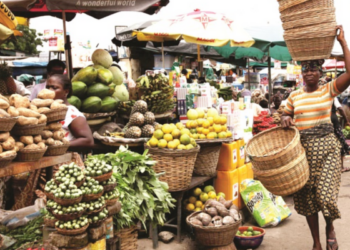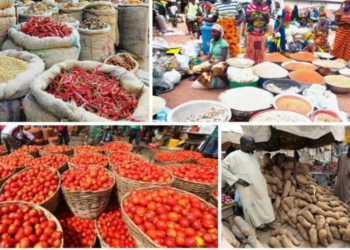Advocates of weaker currencies, love to sing the praises of a floundering local currency.
As most of them will tell you, a weak currency acts like a booster for exports, making them more attractive to global buyers and increasing local currency earnings when converted.
Nigeria has just savoured a taste of this much-touted benefit of a weaker currency.
The country’s latest foreign trade statistics for the first quarter of 2024 reveal a record-breaking trade surplus of N6.52 trillion a stunning reversal from the trade deficit of N1.41 trillion in the previous quarter (Q4 2023) and the N927.2 billion deficit in Q1 2023.
The latest report from the National Bureau of Statistics (NBS) shows a substantial increase in exports, thanks to the Naira taking a nosedive.
The NBS data indicates that total exports for Q1 2024 were valued at N19.17 trillion, a 51% increase from the previous quarter’s N12.69 trillion and a staggering 195.47% rise from N6.49 trillion recorded in Q1 2023.
Using the exchange rates of N1309/$1 in March 2024, N907/$1 in December 2023, and N460/$1 in March 2023, exports amount to $14.6 billion, $13.4 billion, and $14.1 billion, respectively. Nigeria hasn’t seen trade figures this favourable in years, even if this is in Naira terms.
Imports rose from N6.4 trillion and N9 trillion in the first and last quarter of 2023 to N12.6 trillion in the first quarter of 2024.
As exports rose, imports also did but at a slower pace leaving the country with a robust balance of trade.
Critics of weaker currencies will quickly point out that inflation is at record highs and the country’s economic realities are perhaps grimmer than ever.
However, this surge in exports in Naira terms highlights Nigeria’s potential to generate significant foreign exchange revenues, particularly through its primary export, crude oil, and potentially through non-commodity exports.
The report highlights that crude oil exports, which accounted for 80.80% of total exports, were valued at N15.49 trillion, representing a 50.20% increase from N10.31 trillion in Q4 2023 and an impressive 200.79% rise from N5.15 trillion in Q1 2023.
Other notable export commodities include liquefied natural gas, sesamum seeds, urea, and superior-quality cocoa beans, all of which recorded double-digit increases in Naira terms.
Agricultural exports also saw significant growth, amounting to N1.04 trillion, up by 123.08% from N463.97 billion in Q4 2023 and by 270.13% from N279.64 billion in Q1 2023.
The devaluation of the Naira played a crucial role in this trade surplus since exports are denominated in dollars, and when converted to the local currency, the value is significantly higher than previously recorded.
While the commodity export-driven record trade surplus is a welcome development, it’s understandably not the kind of earnings we want in exchange for a weaker currency.
Rather, the trade surplus experienced is a vivid example of how much the economy stands to gain if it improves exports of non-commodities or finished/processed goods.
The rise in non-oil exports highlights the potential to generate significant forex inflows if the right policies are in place and exporters have the proper incentives.
It is a pathway to transitioning from a poor frontier economy to an emerging and developed economy a goal many Nigerians believe is achievable.
To reach this goal, countries that have attained this status pursued a policy underpinned by weaker currencies because, when converted into their local currencies, they earn more.
For instance, Japan, China, and Vietnam have all benefited from weaker currencies that make their exports more competitive.
Similarly, other emerging markets like India and Turkey have followed the same path, transforming their economies into major export hubs for finished goods rather than commodities.
By focusing on exporting finished products rather than commodities, these countries can better control prices and maximize revenues. Nigeria can learn from these examples by shifting its focus toward exporting finished goods.
Exporting finished products allows Nigeria to price its goods more competitively in the international market.
It is important to note that being competitive goes beyond just price; it also requires producing what Nigeria excels at producing.
By making Nigerian exports cheaper and more competitive internationally, the weaker currency can stimulate foreign demand for Nigerian goods.
More importantly, weaker currencies can lead to a significant rise in local currency revenues. However, critics will be quick to point out that major challenges remain.
Exporters have often complained of several bottlenecks impeding exports, such as delays at the ports, logistics issues, multiple taxes, and corruption.
These problems cannot be easily resolved, as evidenced by several attempts by previous governments to ease doing business in the country.
Besides easing business operations, the country also faces significant infrastructure deficits.
Nigeria must capitalize on this trade surplus by investing in infrastructure, enhancing production capacities, and fostering a conducive business environment to sustain export growth.
Additionally, policies aimed at reducing import dependency, especially for essential items that can be produced locally, can further improve the trade balance and economic stability.
The journey to achieving exports of finished or processed goods is long and challenging and could take decades.
However, this journey can be accelerated if the proceeds of increased commodity exports driven by weakened currencies are properly channelled.
The proceeds from exports should be strategically reinvested in infrastructure, education, and initiatives that will aid local production and improve exports.
This approach will not only sustain the current momentum but also build a robust foundation for long-term economic growth and stability.
It will also cushion the sacrifices millions of Nigerians are making daily due to the weakened currency.
The trade surplus highlights Nigeria’s potential to generate substantial foreign exchange earnings, which can help stabilize the economy and reduce dependency on external borrowing.
With the right policies and investments, Nigeria could further harness this potential, especially in non-oil sectors, to diversify its export base and strengthen its economic resilience.






















